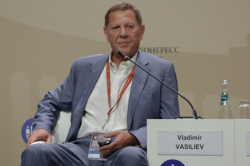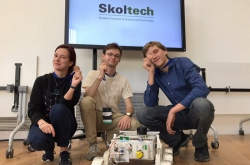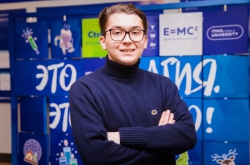The first day’s theme was the development of modern forms of education and new training strategies. The forum brought together the world’s leading professors, international business representatives, and government officials willing to discuss the most efficient training methods and approaches.
One of the main highlights was the discussion “Education 4.0. From university to business”. The list of the discussion’s participants included ITMO University Rector Vladimir Vasilyev, TU Ilmenau Rector Peter Scharff, Catholic University of Leuven Professor Stepan Lomov, Vice-Chairman of the RUSNANO Company Management Board Yury Udaltsov, one of Mail.Ru Group’s directors Sergey Mardanov, and Siemens Vice President Martin Gitsels, among others.

As RVC CEO Aleksander Povalko noted when opening the discussion, economic development relies heavily on how well-trained the staff are and how well they are prepared for the challenges of the global business environment. And it’s not only about knowledge but also about teamwork skills and ability to work under uncertainty, which, in turn, makes some traditional educational approaches increasingly irrelevant. What needs to be done to make the system work? How to create conditions for collaboration between businesses and universities?
Business’ perspective: what does industry want from universities?
According to Siemens Vice President Martin Gitsels, who talked about how companies worldwide collaborate with educational institutions, universities are responsible for training future generations of researchers and professionals, which is even more true for technical universities. The industry is, in turn, interested in employing highly qualified specialists with in-depth technical knowledge. However, what is also important, is whether a specialist is ready to continue learning after graduation.

“With technologies developing faster than ever before, the university can’t teach you everything you are going to need in your life. That’s why one of our main tasks is to teach students to think outside of the box and always look for new opportunities to apply their skills and knowledge. Let’s take Steve Jobs as an example. Wasn’t it his creativity and willingness to see the bigger picture that helped him become one of the most innovative entrepreneurs in modern history?” shared Martin Gitsels.
Sergey Mardanov, one of Mail.Ru Group’s Directors, expanded on the Russian experience of business-universities collaboration. According to the expert, the company has long been collaborating with many Russian universities, including ITMO University. As a result of this collaboration, more than 3,000 students have the opportunity to participate in the company's courses. However, there are still problems that remain to be solved.

“These problems mostly have to do with all sorts of legal issues, such as rent, signing agreements, etc. If it takes too much time to figure these things out, we are forced to look for other partners. On the whole, however, all such problems can be solved. The most important thing here is trust. If a company and a university trust each other, everything is possible. The good thing is that more and more universities are starting to realize that their students lack practical skills, and they know where to get them,” commented Sergey Mardanov.
Universities’ perspective: how to make business and universities work together?
According to ITMO University Rector Vladimir Vasilyev, one of the most important things when establishing a mutual development strategy is to stay synced with each other.
“Things develop rapidly in the field of information technologies; business is used to working in this kind of environment, and universities should also factor in these changes. Because only those universities that build their development strategies in accordance with these changes will achieve the results they’re looking for,” said the Rector.

Vladimir Vasilyev also noted that students’ personal study plans are also becoming very important. Among the universities that take it into account are MIT and the Nanyang Technological University.
In 2017, ITMO developed its unique “code” which represents the university’s development strategy in the areas of education, science and research, ecosystem creation and the transformation of its management model and system, and is expressed in the formula V+F+PS+SS, where V stands for “values”, F for “fundamental”, PS for “professional skills” and SS for “soft skills”, observed ITMO University Rector.

The 7th Open Innovations International Forum is held at the Skolkovo Innovation Center on October 15-17, 2018. Participants from more than 90 countries came to Moscow to take part in the event. This year’s topic is “Sources of the digital breakthrough”.




